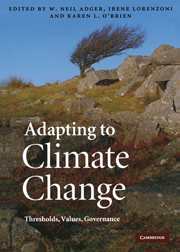Book contents
- Frontmatter
- Contents
- List of contributors
- Preface
- 1 Adaptation now
- Part I Adapting to thresholds in physical and ecological systems
- 2 Ecological limits of adaptation to climate change
- 3 Adapting to the effects of climate change on water supply reliability
- 4 Protecting London from tidal flooding: limits to engineering adaptation
- 5 Climate prediction: a limit to adaptation?
- 6 Learning to crawl: how to use seasonal climate forecasts to build adaptive capacity
- 7 Norse Greenland settlement and limits to adaptation
- 8 Sea ice change in Arctic Canada: are there limits to Inuit adaptation?
- Part II The role of values and culture in adaptation
- Part III Governance, knowledge and technologies for adaptation
- 31 Conclusions: Transforming the world
- Index
- References
5 - Climate prediction: a limit to adaptation?
Published online by Cambridge University Press: 31 August 2009
- Frontmatter
- Contents
- List of contributors
- Preface
- 1 Adaptation now
- Part I Adapting to thresholds in physical and ecological systems
- 2 Ecological limits of adaptation to climate change
- 3 Adapting to the effects of climate change on water supply reliability
- 4 Protecting London from tidal flooding: limits to engineering adaptation
- 5 Climate prediction: a limit to adaptation?
- 6 Learning to crawl: how to use seasonal climate forecasts to build adaptive capacity
- 7 Norse Greenland settlement and limits to adaptation
- 8 Sea ice change in Arctic Canada: are there limits to Inuit adaptation?
- Part II The role of values and culture in adaptation
- Part III Governance, knowledge and technologies for adaptation
- 31 Conclusions: Transforming the world
- Index
- References
Summary
Introduction
Projections of future climate and its impacts on society and the environment have been crucial for the emergence of climate change as a global problem for public policy and decision-making. Climate projections are based on a variety of scenarios, models and simulations which contain a number of embedded assumptions. Central to much of the discussion surrounding adaptation to climate change is the claim – explicit or implicit – that decision-makers need accurate, and increasingly precise, assessments of the future impacts of climate change in order to adapt successfully. According to Füssel (2007), ‘the effectiveness of pro-active adaptation to climate change often depends on the accuracy of regional climate and impact projections, which are subject to substantial uncertainty’. Similarly, Gagnon-Lebrun and Agrawala (2006) note that the level of certainty associated with climate change and impact projections is often key to determining the extent to which such information can be used to formulate appropriate adaptation responses. If true, these claims place a high premium on accurate and precise climate predictions at a range of geographical and temporal scales. But is effective adaptation tied to the ability of the scientific enterprise to predict future climate with accuracy and precision?
This chapter addresses this important question by investigating whether or not the lack of accurate climate predictions represents a limit – or perceived limit – to adaptation.
- Type
- Chapter
- Information
- Adapting to Climate ChangeThresholds, Values, Governance, pp. 64 - 78Publisher: Cambridge University PressPrint publication year: 2009
References
- 101
- Cited by



